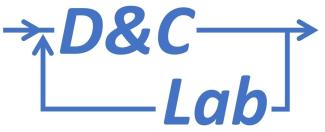D&C Lab
Research Activities
The Decision and Control Laboratory (D&C Lab) is dedicated to advancing both theoretical and applied research in systems, control, optimization, and decision-making. Its mission is to contribute to scientific progress and technological innovation by engaging with public institutions and private enterprises at the regional, national, and international levels.
The D&C Lab’s work aligns with the disciplinary sector “Systems and Control Engineering” (09/G1), with a particular emphasis on fostering technology transfer and the dissemination of research outcomes across academic and industrial domains.
The laboratory is based on the university campus in Bari and operates within a multidisciplinary framework. Research and experimental activities are organized across the following main thematic areas:
1. Management and Control of Complex Systems
-
Development of advanced algorithms and ICT solutions for proactive decision-making in domains such as energy, transport, production, and healthcare
-
Decentralized and distributed control methods for large-scale interconnected systems
-
Optimization and supervisory control of complex processes and infrastructures
-
Decision support systems for intelligent transportation, multimodal logistics, and hazardous freight operations
-
Control strategies for smart mobility and the management of smart environments
-
Frameworks for the design and governance of smart grids, smart cities, and smart communities
-
Strategies for sustainable, intermodal, and co-modal mobility
-
ICT-based solutions for logistics, production, and health service management
-
Modeling, simulation, and control of discrete event systems
-
Nonlinear system modeling and control
2. Modeling, Control, and Optimization in Industrial Contexts
-
Methodologies supporting Industry 4.0 paradigms
-
Re-engineering and automation of industrial processes
-
Coordination strategies for multi-agent systems and sensor networks
-
Fault detection, isolation, and recovery mechanisms
-
Optimization of logistics, production, and distribution chains
-
Scheduling, workflow management, and decision support in manufacturing systems
-
Model-based techniques to enhance technological product/process efficiency
-
Decision-making under uncertainty and large-choice scenarios
-
Management of procurement and supply networks
-
Integration of best practices in advanced manufacturing
3. Management, Control, and Optimization of Energy Systems
-
Strategic level: Development of analytical and decision-support tools for urban policymakers focused on long-term energy efficiency strategies. Application domains include building and building grid sectors, public lighting systems, and integrated urban energy systems
-
Operational level: Control and scheduling strategies for smart energy users, optimization frameworks for smart homes and smart home networks, and solutions for the optimal charging of electric vehicles
